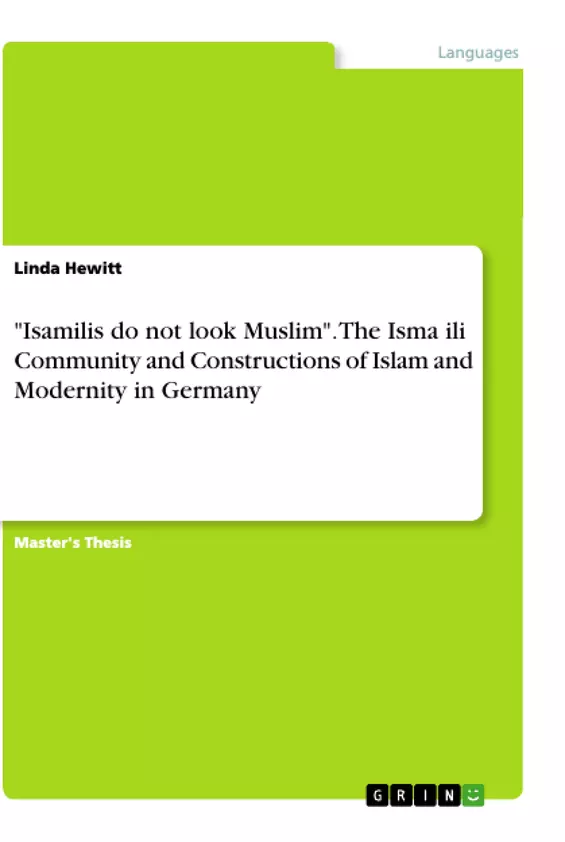This thesis examines Ismaʿili individuals’ "lived religion"through personal views on religious values combined with daily practices in German society.
Since a Eurocentric view on Islam often fails to recognize the complexities of Muslim communities while emphasizing the Muslim faith as incompatible with "modernity", the current study of the Ismaʿili branch serves as an example of Muslim practices that adapt and adjust its divine principles to a modern and secular society while maintain its unique religious identity. Important values of everyday life are observed in connection to Ulrich Beck’s and Anthony Gidden’s "reflexive modernity" theory as a process that encompasses old and new traditions while adapting ambiguous and pluralist forms of contemporary societies.
This thesis begins with a depiction of the historical background describing Ismaʿili religious principles in order to grasp a general understanding of this specific community. Chapter three discusses significant literature relating to the research topic, examining publications about the Ismaʿili discourse and the Aga Khan’s ideology. Furthermore the author investigates ethnographic research about Ismaʿili communities living in European and Canadian societies, as a form of comparative literature. Chapter four discusses theories of modernity, late modernity and post-modernity in relation to pluralism thoughts that are relevant in the study of "progressive Muslims" and "modern" Islamic approaches. Subsequently, chapter five illustrates the methodological considerations serving this study and theapproach of semi-structured life-history interviews as a narrative research design. The study concludes with the findings and analysis sections in chapter six and seven which focus on main values of the studied narratives and their perception of modernity in connection to the chosen theoretical framework.
Inhaltsverzeichnis (Table of Contents)
- Introduction
- Research Purpose
- Disposition
- Historical Background
- The Development of an Isma'ili Belief System
- Ismaili Principles
- Literature Review
- Ismailis as a Whole
- Isma'ilis in European and Canadian Societies
- Theoretical Framework
- Anthropology of Lived Religion
- A Theoretical Foundation: Modernity and late-Modernity
- Response to Modernity
- Pluralism
- Methods
- Design of the Study
- Semi-structured Interviews
- Validity
- Choice and Implementation of Analysis of Data
- Limitations and Biases
- Ethical Considerations
- Findings
- Participants' Profile
- Education and Language
- Professional Fulfilment
- Volunteering and Solidarity Thought
- Acceptance, Integration and Adaptability
Zielsetzung und Themenschwerpunkte (Objectives and Key Themes)
This thesis investigates the lived religion of Isma'ili individuals in Germany, exploring their personal views on religious values and how they integrate these into their daily lives within German society. The study challenges the common Eurocentric view of Islam, which often fails to recognize the complex realities of Muslim communities and portrays Islam as incompatible with "modernity". By focusing on the Isma'ili branch, the thesis presents an example of how Muslim practices adapt and adjust their divine principles to a modern and secular society while maintaining their unique religious identity.
- The lived religion of Isma'ili individuals in Germany
- The adaptation of Islamic principles to a modern and secular society
- The challenge of Eurocentric perspectives on Islam and "modernity"
- The role of "reflexive modernity" in shaping Isma'ili practices
- The preservation of religious identity within a pluralistic society
Zusammenfassung der Kapitel (Chapter Summaries)
The introduction outlines the research purpose, which is to explore how Isma'ili individuals in Germany navigate their religious beliefs and practices within a modern and secular society. It also provides an overview of the thesis's organization.
Chapter 2 provides a historical background on Isma'ilism, tracing the development of its belief system and outlining its core principles. This section sets the context for understanding the contemporary practices of Isma'ili individuals in Germany.
Chapter 3 delves into the existing literature on Isma'ilism, examining both general studies of the community and specific research on Isma'ili communities in European and Canadian contexts. This chapter provides a framework for understanding the current research on Isma'ili communities and their adaptation to diverse social environments.
Chapter 4 outlines the theoretical framework of the thesis, drawing on anthropological approaches to understanding lived religion and theories of modernity and late-modernity. This chapter provides the theoretical foundation for analyzing the data collected from Isma'ili individuals in Germany.
Chapter 5 details the methods employed in the study, including the design of the study, the use of semi-structured interviews, and the procedures for data analysis. This chapter ensures the transparency and rigor of the research methods.
Chapter 6 presents the findings of the study, focusing on the profiles of the participants, their experiences with education and language, their professional lives, their engagement in volunteering and solidarity work, and their perspectives on acceptance, integration, and adaptability within German society. This chapter presents the core results of the research.
Schlüsselwörter (Keywords)
The central themes of the thesis revolve around the Isma'ili community, its relationship to Islam and modernity, and its experience in Germany. Key terms and concepts include Isma'ilism, Aga Khan, Islam in Germany, modernity, pluralism, lived religion, reflexive modernity, and integration.
Frequently Asked Questions
Who are the Ismaʿilis?
Ismaʿilis are a branch of Shia Islam. The community is known for its progressive approach and is led by the Aga Khan.
What is "lived religion"?
Lived religion refers to the actual religious practices and personal values of individuals in their daily lives, rather than just official doctrines.
How do Ismaʿilis in Germany perceive modernity?
They often see no conflict between their faith and a modern, secular society, adapting divine principles to contemporary challenges while maintaining their identity.
What is reflexive modernity in this context?
Based on theories by Beck and Giddens, it describes a process where traditions are re-evaluated and adapted to pluralist, modern societies.
What are core values found in the Ismaʿili narratives?
Key values include education, professional fulfillment, volunteering, solidarity, and a strong sense of integration and adaptability.
- Quote paper
- Linda Hewitt (Author), 2016, "Isamilis do not look Muslim". The Ismaʿili Community and Constructions of Islam and Modernity in Germany, Munich, GRIN Verlag, https://www.grin.com/document/513927



